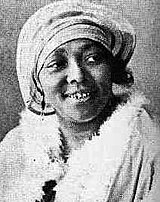Lucille Bogan
| Lucille Bogan | |
|---|---|
 |
|
| Background information | |
| Birth name | Lucille Anderson |
| Also known as | Bessie Jackson |
| Born |
April 1, 1897 Amory, Mississippi, United States |
| Died | August 10, 1948 (aged 51) Los Angeles, California, United States |
| Genres | Delta blues, country blues |
| Occupation(s) | Singer |
| Instruments | Vocals |
| Years active | 1923–1935 |
Lucille Bogan (April 1, 1897 – August 10, 1948) was an American blues singer, among the first to be recorded. She also recorded under the pseudonym Bessie Jackson. The music critic Ernest Borneman stated that Bogan was one of "the big three of the blues", along with Ma Rainey and Bessie Smith. Many of Bogan's songs have been covered by later blues and jazz musicians, including Buddy Guy, B.B. King, and Sonny Boy Williamson.
Many of her songs were sexually explicit and she was generally considered to have been a dirty blues musician.
She was born Lucille Anderson in Amory, Mississippi, and raised in Birmingham, Alabama. In 1914, she married Nazareth Lee Bogan, a railwayman, and gave birth to a son, Nazareth Jr., in either 1915 or 1916. She later divorced Bogan and married James Spencer, who was 22 years younger than she.
She first recorded vaudeville songs for Okeh Records in New York in 1923, with the pianist Henry Callens. Later that year she recorded "Pawn Shop Blues" in Atlanta, Georgia; this was the first time a black blues singer had been recorded outside New York or Chicago. In 1927 she began recording for Paramount Records in Grafton, Wisconsin, where she recorded her first big success, "Sweet Petunia", which was covered by Blind Blake. She also recorded for Brunswick Records, backed by Tampa Red and Cow Cow Davenport.
By 1930 her songs tended to concern drinking and sex, such as "Sloppy Drunk Blues" (covered by Leroy Carr and others) and "Tricks Ain't Walkin' No More" (later recorded by Memphis Minnie). She also recorded the original version of "Black Angel Blues", which (as "Sweet Little Angel") was covered by B.B. King and many others. With her experience in some of the rowdier juke joints of the 1920s, many of Bogan's songs, most of which she wrote herself, have thinly veiled humorous sexual references. The theme of prostitution, in particular, featured prominently in several of her recordings. One of these was "Groceries on the Shelf (Piggly Wiggly)", which was originally written and recorded by Charlie "Specks" McFadden.Piggly Wiggly is the name of a successful American supermarket chain, operating in the Southern and Midwestern regions of the United States, which first opened in 1916. Bogan used the self-service notion in her amended lyrics to the song, part of which ran "My name is Piggly Wiggly and I swear you can help yourself, And you've got to have your greenback, and it don't take nothin' else".
...
Wikipedia
